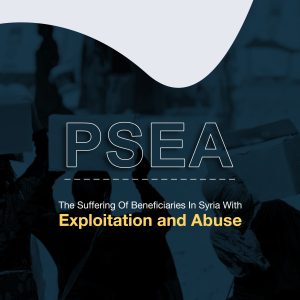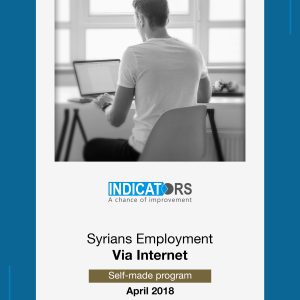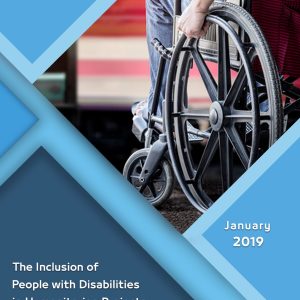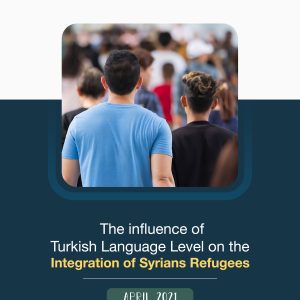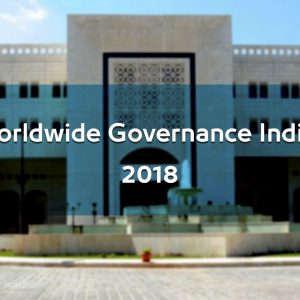PSEA
Given the severity of the IDPs in Syria being subjected to sexual or financial exploitation, we conducted a study in this regard, as we shed light on:
Showing the percentage of people who were subjected to exploitation and abuse by some humanitarian or relief sectors.
The reasons that made the victims of such abuses refrain from filing complaints.
The type and form of the abuse or exploitation they were subjected to
Their extent of their knowledge about how to get help and support in case they are subjected to such abuses.
Rubbish data
Through my experience of working with many organizations, research centers, and academic researchers, I have noticed an issue in the collected data that only can be named as rubbish data or useless data.
The idea of useless data can be summarized as data or questions asked in questionnaires that are not useful in anything related to the objectives of the research, for example in many monitoring or evaluation activities, questions are asked in beneficiary interviews about the family structure in detail, such as asking about the family members disaggregated by gender and age groups. Some may think that these data are important, but experience says the opposite, as these data are important in the phase of needs assessment and selection of beneficiaries, which were already collected in the previous activities, and all the cases I witnessed did not use this data (in the course of writing a monitoring or evaluation report), and in the best case, the family members data were grouped into a final number, so why were all these details asked and make the beneficiaries exhausted with all these questions?
The belief of some researchers that if these data are not useful, it will not cause any issues is wrong, as a large number of questions and asking questions that have nothing to do with the research objectives causes several problems, including an increase in costs, an increase in the participants’ hesitation and fear due to a large number of details that are asked about and the lack of Its rationality, the decrease in the participants’ interest in providing serious answers due to the increase in the duration of the interview and their fatigue, an increase in the possibility of errors in data collection, an increase in the complexities of data analysis, distracting the researcher from the processing data and writing the report and thus discussing topics that not related to the objectives of the research and distracting the decision-makers.
The observed cases that may be called rubbish data are uncountable. Asking about the name of the participant in a political poll in which the name of the participant does not matter at all, it only expresses his legal personality as a representative of a sample of the surveyed community groups (except in rare cases related to verification and follow-up of the data collection teams), asking about the participant’s name will necessarily lead to providing answers that stray more from his true opinions, as a result of his fear of linking those answers to his name and exposing him to any harm. I always advise that the questions we ask to be linked to the objectives of our research and not to say, “We wouldn’t lose anything if we ask this question.”
By:
Ghaith Albahr: CEO of INDICATORS
SYRIANS EMPLOYMENT VIA INTERNET
Online working doesn’t need the working to stay in the same place, which is make it suitable for Syrian situation, while Syrians can work wherever they move, they only need an internet connection and a computer to continue their work.
Another benefit comes from the income, which it will be in foreign currency, that means higher income comparing to the low prices of Syrian pound. This also brings money to the local market which increases its movement.
Brief of the assessment:
Objectives: This assessment is trying to increase the opportunities of Syrians online working, by screening the available competencies that suitable for such business, and discovering the projects that can be most effective and helpful for them to start working via internet, then share them with the NGOs that interested Syrian employment.
Main themes:
- Syrian competencies for online working.
- Description of the situation of current Syrian online workers.
- Barriers and challenges of online working, especially for Syrians.
- Expectations of growth for online working in Syria.
- Recommended projects to prepare Syrians for online working.
Scope:
The assessment will cover 3 governorates: Idleb, Daraa, and Aleppo.
Will be conducted in January/2018.
Target groups:
The questions concentrate on Syrian youth, females, and people with disability.
Data sources:
- Syrian individuals: to screen the competencies they have for online working, their awareness about it, and the equipment they have for such business.
- Syrian online workers: to provide full stories about some online workers, how they started their work, their monthly salaries, the challenges that face them, their needs to improve their business…
- Online working consultants: to have in depth information about online working, what they recommend for Syrian situation, what they recommend to deal with the challenges of Syrians online working, what kind of trainings Syrians need to be able to start working online…
- Secondary data: to review any research have been done about online working, what are the most demanded services, how online working platforms working, how to manage money transfers…
Syrians Online working
Online working doesn’t need the working to stay in the same place, which is make it suitable for Syrian situation, while Syrians can work wherever they move, they only need an internet connection and a computer to continue their work.
Another benefit comes from the income, which it will be in foreign currency, that means higher income comparing to the low prices of Syrian pound. This also brings money to the local market which increases its movement.
Brief of the assessment:
Objectives: This assessment is trying to increase the opportunities of Syrians online working, by screening the available competencies that suitable for such business, and discovering the projects that can be most effective and helpful for them to start working via internet, then share them with the NGOs that interested Syrian employment.
Main themes:
- Syrian competencies for online working.
- Description of the situation of current Syrian online workers.
- Barriers and challenges of online working, especially for Syrians.
- Expectations of growth for online working in Syria.
- Recommended projects to prepare Syrians for online working.
Scope:
The assessment will cover 3 governorates: Idleb, Daraa, and Aleppo.
Will be conducted in January/2018.
Target groups:
The questions concentrate on Syrian youth, females, and people with disability.
Data sources:
- Syrian individuals: to screen the competencies they have for online working, their awareness about it, and the equipment they have for such business.
- Syrian online workers: to provide full stories about some online workers, how they started their work, their monthly salaries, the challenges that face them, their needs to improve their business…
- Online working consultants: to have in depth information about online working, what they recommend for Syrian situation, what they recommend to deal with the challenges of Syrians online working, what kind of trainings Syrians need to be able to start working online…
- Secondary data: to review any research have been done about online working, what are the most demanded services, how online working platforms working, how to manage money transfers…
For those interested in this study and its results:
Click here
Syrians’ Right to Legal Documents
Due to the importance of personal identification documents and the negative
consequences of not possessing them on the lives of individuals, this study was
conducted, in order to reveal the numbers of Syrians who do not have personal
identification documents, and to define the most prominent personal identification
documents that Syrians suffer tremendously to obtain, while listing the negative
consequences of not possessing them.
The study was conducted in the cities of Idlib and Salqeen in Syria, it also included the
city of Urfa in Turkey and the regions of Arsal and the Bekaa in Lebanon, in which 305
male and female participated, taking into consideration while selecting them a
number of variables such as status of residence, age and social status, and data
collection was conducted using a questionnaire with closed-ended questions.
The results of the study showed that many Syrians, whether residing in the liberated
areas or in the countries of refuge, do not possess the personal identity documents of
all kinds, especially passports, civil registry record or educational documents.
Additionally, many Syrian children are still not registered at official state departments
and many young people, who are more than fourteen years old, still do not possess
IDs. Many Syrian have lost their personal identification documents as a result of the
bombing of their areas or during displacement, or it was confiscated or destroyed by
the various military bodies and forces dominated by the Syrian regime.
The fear of being arrested by the pro-regime forces prohibited many Syrians from
traveling to regime areas which constituted the main reason for the Syrians’ inability
to obtain any official document. In addition to the fact that many of them cannot
afford paying for these documents, considering that paying bribes to employees of the
governmental institutions or hiring a lawyer is the most common ways to obtain these
documents.
As for the negative outcomes of the non-possession of official documents and not
registering personal affairs documents in the official government departments, the
most concerning issue is depriving unregistered children from their nationality,
particularly in the event of the inability to register the marriage documents, and the
inability of people without personal IDs to vote or run for public services jobs or state
departments jobs, in addition to depriving them of many of their most basic rights that
people cannot live properly without it, such as the right to education, the right to
work, the prevention of travel and the restriction of individual freedom and
deprivation of health care.
The inclusion of PWDs in humanitarian projects
According to United Nations statistics, 15% of the world’s population has disabilities, and they are suffering from several types of discrimination in their communities, or difficulties resulting in denying them from having equality with other people in having some of their basic rights, such as the right to education, the right to work and the right to freedom of movement. Knowing that all international conventions related to people with disabilities guarantee them these rights and promote equalizing them with other groups of society and states the necessity of removing obstacles that are hindering them from accessing the main services provided.
Regarding the effort to integrate people with disabilities into society and to preserve their basic rights, most countries enact laws that protect them from all forms of discrimination. However, in countries suffering from internal conflicts, where the role of state institutions is absent and their services in the areas that are out of their control are ceased, as in the case of Syria, where these state institutions are replaced by bodies, institutions, non-governmental organizations or humanitarian organizations that carry out the tasks of providing essential services to people affected by crises, without being abided by specific laws, but whose work is governed by the principle of working to meet the needs of the most vulnerable people and people with most urgent needs.
In this context, we wonder about the ability of humanitarian organizations to abide by the principles of humanitarian action, which is based on the need for equality between the groups affected by crises, especially in the Syrian situation, where we have a large number of affected people, including people with disabilities, whose number has significantly increased due to the current war to reach 2.8 million people who are physically disabled according to the United Nations estimates.
Therefore, we will discuss through this study the extent of the humanitarian organizations targeting for people with disabilities through the projects that they are implementing, and the extent to which they consider their most important requirements and needs, and to analyze their ability to identify the people with disabilities and deal with the challenges these organizations face when trying to reach them, with highlighting obstacles that confront people with disabilities in accessing the services provided by those organizations.
The influence of Turkish Language Level on the Integration of Syrians Refugees
view of the importance of working to achieve the integration of Syrian refugees into Turkish society, to reduce the tension among Turks towards the Syrians, and to determine the role of the Turkish language in achieving that integration, we have conducted this study, which aims to reveal the level of mastering the Turkish language among Syrian refugees in Turkey, identifying the reasons that hinder their ability to learn the Turkish language, knowing the degree of integration of Syrians into Turkish society, and the impact of their mastery of the language on their integration and Turks acceptance of them. and to know the situation of Syrian refugees in Germany regarding learning the German language in order to benefit from the German experience in developing the language abilities and skills of Syrian refugees in Turkey.
The study was conducted during the second half of 2020 and covered the states of Istanbul, Gaziantep, Hatay, and Urfa, which are the states in which the largest number of Syrians reside. During the study, key informant interviews were conducted with key informants interested in refugees’ integration in Turkey and Germany, and questionnaires were conducted with 340 Syrians residing within the states covered by the study, and the study adopted a stratified random sampling method to ensure including Syrians according to several variables such as gender, age, and educational level
